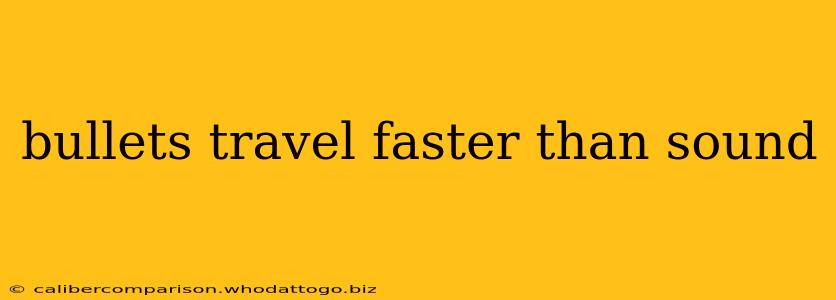The notion that bullets travel faster than sound is a common misconception, often fueled by action movies and a general lack of understanding about ballistics. While the statement is often true, it's not universally applicable. Let's delve into the physics and explore the nuances of this fascinating topic.
The Speed of Sound: A Variable Factor
First, we need to understand that the speed of sound isn't a constant. It varies depending on several factors, most notably:
- Temperature: Sound travels faster in warmer air. The hotter the air molecules, the faster they vibrate and transmit the sound wave.
- Altitude: The speed of sound decreases with altitude due to changes in temperature and air density.
- Medium: Sound travels faster in denser mediums like water and solids than in air.
This variability is crucial because a bullet's speed is also affected by factors such as:
- Caliber: Larger caliber bullets generally have a slower muzzle velocity compared to smaller calibers.
- Gunpowder: The type and amount of gunpowder significantly impact the bullet's speed.
- Barrel Length: Longer barrels generally impart higher velocities to the bullet.
When Bullets Outpace Sound: Supersonic vs. Subsonic
The crucial distinction lies between supersonic and subsonic bullets.
-
Supersonic Bullets: These travel faster than the speed of sound in the surrounding medium (typically air). This results in the characteristic sonic boom—a loud bang caused by the shock wave created as the bullet breaks the sound barrier. Many common handgun and rifle cartridges fire supersonic rounds.
-
Subsonic Bullets: These travel slower than the speed of sound. They are often used in situations where minimizing noise is crucial, such as hunting or law enforcement operations. Special ammunition is designed to achieve subsonic velocities.
The Sonic Boom: A Consequence of Supersonic Speed
The sonic boom isn't just a sound; it's a physical phenomenon. As a supersonic object moves, it creates a pressure wave that builds up and collapses, resulting in a loud bang. This is why you hear the crack of a bullet whizzing by—it's the sound of the shock wave.
Beyond the Basics: Factors Affecting Bullet Velocity
Several factors influence the speed of a bullet, and subsequently whether it's supersonic or subsonic:
- Drag: Air resistance slows the bullet down over distance. This means even supersonic bullets will eventually slow below the speed of sound.
- Gravity: Gravity constantly pulls the bullet downwards, affecting its trajectory and overall speed.
- Wind: Wind can either increase or decrease the bullet's effective speed, depending on its direction.
Conclusion: It's Complicated!
While the simplified statement "bullets travel faster than sound" is often true for many commonly used rounds, it's an oversimplification. The speed of both sound and bullets are variable, making a definitive statement without considering specific environmental conditions and ammunition type impossible. Understanding the nuanced relationship between bullet velocity, the speed of sound, and the resulting sonic boom is crucial for anyone interested in ballistics.

